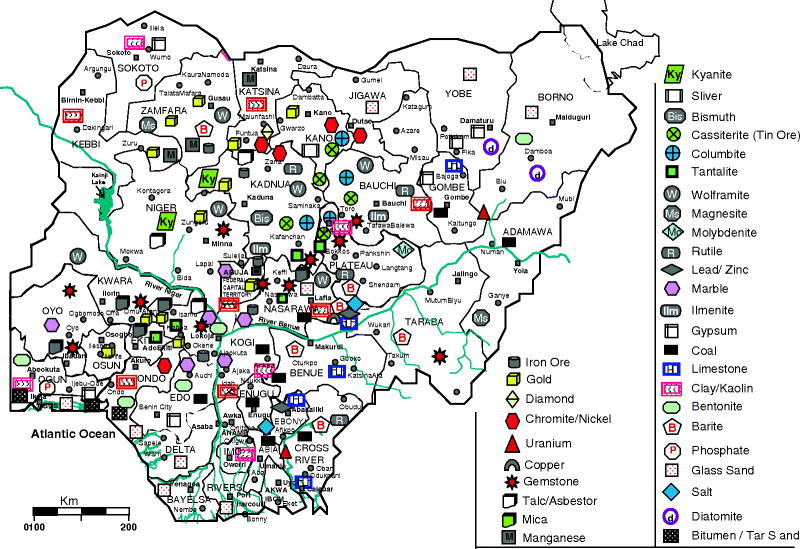Back to: GEOGRAPHY SS1
Welcome to class!
In today’s class, we will be talking about Nigeria: mineral resources. Enjoy the class!
Nigeria: Mineral Resources

Mineral resources in Nigeria
Petroleum or crude oil:
Petroleum is a sedimentary rock mineral found in Port Harcourt (Rivers State), Warri and Ugheli (both in Delta State), Akwa-Ibom and Imo State. The first oil well in Nigeria was sunk in Oloibri near Port Harcourt. Other oil wells are found in Afam, Ugheli, Warri, Egbema, etc. Petroleum is refined by a method called fractional distillation in refineries located in Port Harcourt, Warri and Kaduna.
Method of mining petroleum
The method used in mining petroleum is the drilling method. Here, the rocks are sampled and tested for traces of oil. When any trace is found, a well is sunk to reach it with the aid of a drilling rig. The oil is then pumped out mechanically or naturally if the pressure within the oil zone in the soil is high.
Coal:
Coal is also a sedimentary rock mineral found in Enugu and Okaba (Benue State). The type of coal found in Nigeria is the sub-bituminous grade. Coal is mainly used as a major source of fuel both in homes and railway locomotives in the past.
Method of mining coal
Coal is mined by underground mining or adit method. Here, a tunnel or adit is cut into the coal seam. Explosives are then used to shatter the coal. A light rail car is then used to haul the coal from the tunnel to the surface or into waiting Lorries.
Evaluation
- Which type of rock is petroleum?
- Mention states in Nigeria where this mineral is found.
- Explain the method of mining coal.
Iron ore:
This is a basement complex rock mineral found in Itakpe (Kogi State) and Aladja (Delta State). Iron ore is the major raw material used in iron and steel complex. Iron and steel complexes are found in Ajaokuta (Kogi State) and Aladja (Delta State). Iron and steel rolling mills are located in Oshogbo (Osun State), Jos (Plateau State) and Katsina (Katsina State).
Method of mining iron ore
Iron ore is mined by a method called open cast method.
- Explosives are used to blast and remove overburden rocks.
- A powerful machine called drainage is then used to pile the ore into a heap.
- A monitor is then used to direct a powerful jet of water towards the heap.
- The water washes the soil out through a series of sluice boxes.
- The iron sinks to the bottom of the sluice boxes while the water carries the dirt away.
- The iron concentrate now formed is later sent to the factory for smelting.
Tin and columbite:
These are basement complex rock minerals found near Jos (Plateau State). Tin is used for coating containers in the caning industry while columbite is used in the manufacturing of heat resistant steel used in Jet engines. Tin and columbite occur together naturally just like petroleum and natural gas.
Method of mining tin and columbite
Tin and columbite are mined by a method called open-cast method (used also for mining Iron ore). The process of mining is as follows:
- Explosives are used to remove the overburden rocks.
- A powerful machine called drainage is then used to pile the tin into a heap.
- A monitor is then used to direct a strong jet of water towards the heap.
- The water washes the soil out through a series of sluice boxes.
- The tin ore sinks to the bottom of the sluice box while the water carries the dirt away.
- The tin concentrate now formed is later sent to the factory for smelting.
Limestone:
This is a sedimentary rock mineral found in Ewekoro and Shagamu (Ogun State), Ukpilla (Edo State), Calabar (Cross River), Nkalagu (Anambra State), Benue and in Sokoto State. Limestone is an essential raw material for the manufacturing of cement. All cement industries are located in all the above areas where limestone is found.
Method of mining limestone
Limestone is mined by a method called quarrying
- In this method, the overburden rocks are scraped off with mechanical excavations in other to reach the limestone.
- The limestone is then shattered with explosives and scooped out by the excavator into trucks waiting to carry it to the factor
Evaluation
- Which method is used in mining iron ore?
- Explain the method of mining tin.
- Explain the method of mining limestone.
Importance of minerals
- Provision of employment.
- Revenue generation.
- Foreign exchange earnings.
- Provision of raw materials for industries.
- Provision of essential goods like kerosene, petrol, grease, engine oil, etc.
- Important for the standard of good living.
- Growth of towns.
- Acquisition of skills.
- Production of geological maps.
Problems facing mining
- Poor management.
- Environmental pollution e.g. oil spillage.
- Poor transport network.
- Inadequate capital for exploitation.
- Outdated topographic maps.
- Difficult terrains.
- A high rate of sabotage by unpatriotic people.
- Fluctuation in world prices of minerals.
- Problems of constant conflicts with the local people and the prospecting companies.
General evaluation
- List some of the minerals that can be found in Nigeria.
- Which states are these minerals mentioned found?
- Explain the method of mining tin and columbite.
- State the importance of minerals to the economy of Nigeria.
- What are some of the problems encountered in the process of mining?
Reading assignment
Essential Geography, O.A. Iwena Pages 255-257.
Theory
Draw an outline map of Nigeria and on it locate and name one area where the following minerals are found (a) coal (b) tin (c) limestone (d) petroleum
In our next class, we will be talking about Nigeria: Power Resources. We hope you enjoyed the class.
Should you any further question, feel free to ask in the comment section below and trust us to respond as soon as possible.

This page is wonderful